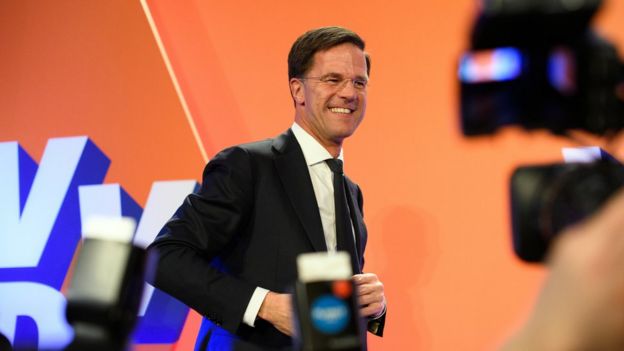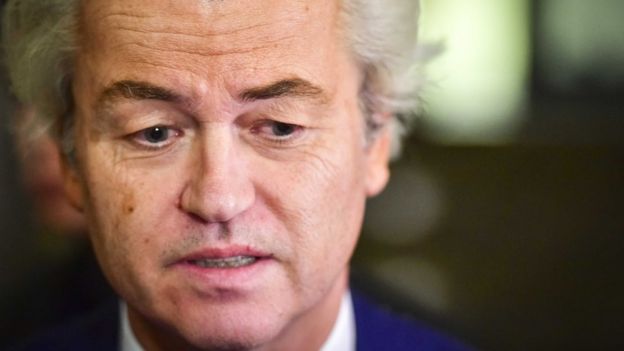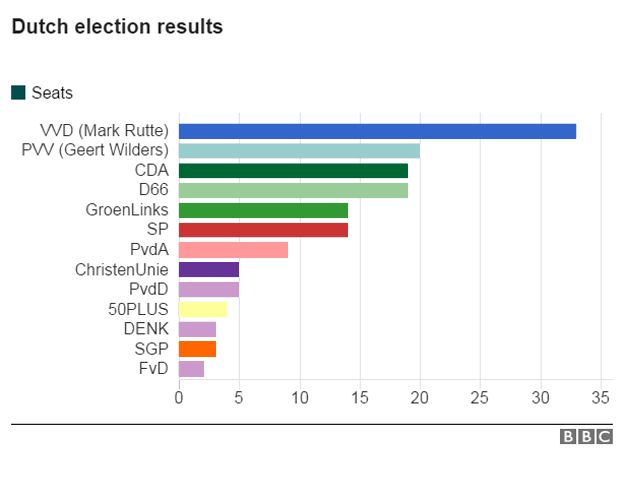Dutch election: Voters return a new reality

More than 10 million people voted in Wednesday’s election for the Dutch parliament
A breeze rustles the proud daffodils outside parliament amid the spring sunshine.
The glorious weather was one reason for the high 80% turnout. Another was that Dutch voters realised the importance of this election.
The result means everything can stay the same, but the reality is far more fragmented and the mainstream parties would be foolish to ignore it.
Who are the big winners and losers?
The diplomatic stand-off with Turkey presented centre-right leader Mark Rutte with an electoral dream and provided a platform to project his prime ministerial calm across the country.

His victory was decisive and yet he lost a quarter of his seats in parliament. The leader of the EU’s sixth largest economy defeated Geert Wilders’ Freedom party with “Wilders-lite” policies to woo back those flirting with the idea of voting for the populists.
The result appears to contradict suggestions that the EU is falling apart, with significant successes for the pro-EU Green-Left and D66. Eyes will turn next to voters in France and Germany to see if that is true.
A photo of the BBC interviewing the earnest young leader of the Green-Left party was widely shared on social media.
Jesse Klaver’s optimistic grassroots campaign has done what Mr Wilders had wanted – inspired a movement beyond Dutch borders.
The man nicknamed “Jessiah” preaches a different brand of populism: “We are the opposite of Wilders, he is hate and we are love,” he told me while being swamped by a sea of selfie-snapping schoolgirls.
Labour, traditionally the biggest party on the left, had been the junior party in Mr Rutte’s budget-cutting coalition and became the biggest loser on the night.
Supporters said they had sold out on their principles and they paid the ultimate price at the polls. Jesse Klaver is aware of the risks involved in joining a coalition dominated by right-of-centre parties.

Geert Wilders’ party is now the Netherlands’ second largest but polls suggested he would do better
What does this mean for Wilders?
Geert Wilders didn’t perform as well as the polls predicted. But he came second and is claiming a win.
Numerous people from Alfred, trundling a suitcase over the cobbles outside parliament, to the tipsy, bright-eyed students twirling inside Amsterdam’s “Milky Way” music venue, referred a jibe by Mark Rutte during a head-to-head debate with his populist rival on Monday. “There is a difference between tweeting from your sofa and running a country,” he said. The effect was to characterise his main rival as a Twitter troll.
Yet more than a million voters chose Mr Wilders’ anti-Islam, anti-EU party, which wants to implement policies that would undermine the Dutch constitution.
Mr Rutte must look at the state of the country and wonder what has made people so disillusioned, or so inspired, that they are prepared to place their faith in a man who runs a Twitter account rather than a traditional political party.
In a campaign dominated by concepts of culture, identity and integration, Geert Wilders succeeded in shaping the debate.
The result suggests a seed has been planned on both sides of the political spectrum.
The next challenge for Mr Rutte is to form a coalition.

Yet more than a million voters chose Mr Wilders’ anti-Islam, anti-EU party, which wants to implement policies that would undermine the Dutch constitution.
Mr Rutte must look at the state of the country and wonder what has made people so disillusioned, or so inspired, that they are prepared to place their faith in a man who runs a Twitter account rather than a traditional political party.
In a campaign dominated by concepts of culture, identity and integration, Geert Wilders succeeded in shaping the debate.
The result suggests a seed has been planned on both sides of the political spectrum.
The next challenge for Mr Rutte is to form a coalition.





